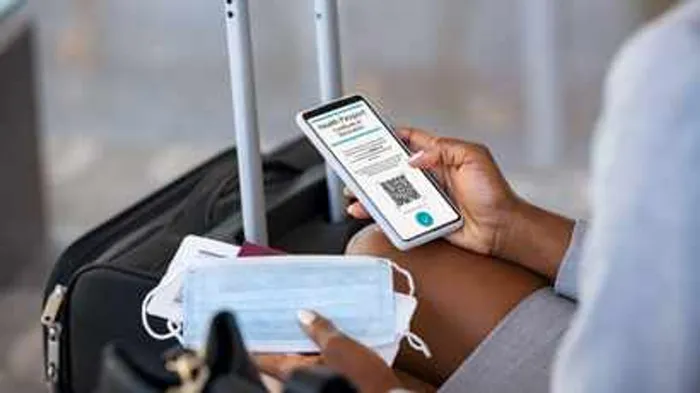Government delays blamed for delay in digital vaccination certificate roll-out in SA

An encrypted digital certificate for vaccinations is much more effective than hard copy proof of the vaccine. Supplied image.
Johannesburg - President Cyril Ramaphosa’s recent Cabinet reshuffle and other governmental delays are being blamed for the absence of digital vaccination certificates in South Africa.
Liam McCreedy, the general manager of Health Passport South Africa, the digital health system recently launched in the country, insists that they are ready to provide the service, which will allow the nation to safely reopen its economy and reinstate some level of normality to everyday life.
But despite the huge public demand for the mobile app, which is able to swiftly provide vaccination details, McCreedy said they are at the mercy of the government.
“Everything is already in place, tested, set up and ready to go and there are absolutely no excuses,” he told The Saturday Star this week.
“The system just works, and after demonstrating to health-care organisations and wider industry, they immediately see the benefits.”
He said that they have already completed a trial at the Melomed Gatesville Vaccination Centre in Cape Town and that the country’s major medical aid companies are already on board, but they are still waiting for approval from the government.
“There have been some changes to the Cabinet so delays are understandable, and we are engaged with the authorities, but the time for talk is over and the people need action,” he said.
The department of health said that they already have digital solutions for the country’s Covid-19 roll-out but that it has been a challenging process.
“This is a potential policy nightmare and we want to make sure that we are not creating further problems of inequity and administrative exclusions,” spokesperson Popo Maja said.
The Health Passport Worldwide mobile system in South Africa, an encrypted digital vaccination solution, is a private service that has been provided to the public at no cost.
McCreedy believes that at its best, the service can be used for people to return to work in all industries, see their loved ones, and it could also see the return of global sporting and entertainment events as well as international travellers.
“The system is designed to put the power back in the hands of the people, enabling them to get back to doing the things in life they love, be that travelling, sports, festivals, conferences and more.”
McCreedy believes that the application of the service in South Africa is not about “reinventing the wheel” as the system has already been a resounding success across the globe.
It is being deployed across four continents and used by scores of people on a daily basis, with new partners and countries coming on board every week.
“For example, the technology is now used in Indonesia and will support the reopening of tourism in Bali,” he said. “In Mexico we are working with local authorities in Cancún to safely reopen travel and events, and in Europe, the mobile apps house the EU Digital Covid-19 Certificate after testing.”
Meanwhile, in Africa the solution is live in Botswana, eSwatini, Nigeria and some parts of Kenya.
The appeal of the service, McCreedy said, is to provide each person with an encrypted digital certificate for vaccinations, which forms part of a database and is much more effective than hard copy proof of the vaccine.
“It’s clear that the majority of people in South Africa want a world-class mobile solution, not a scrap of paper.”

McCreedy added that he and his team have been hard at work developing this “innovative and convenient service”.
“The Health Passport platform launched in South Africa back in December 2020 at the Recharge Live Music Event in Cape Town, where we were the pioneering solution used to safely reopen events and gatherings in South Africa.”
While its use is not yet widespread in the country yet, it is already been used at some sites.
“There are dozens of testing facilities using the system in Gauteng, including Covid-SA, Next Pathology, Inception Biosciences and more.”
But for the service to be fully effective, McCreedy said it needs to be implemented on a much larger scale in South Africa, and that there is already a huge public demand for the app.
“We are inundated daily with thousands of requests from the public to have the Health Passport app updated with a secure digital certificate. The demand is incredibly high because South Africans want to get back to normality and Health Passport Worldwide is one of the tools to quickly enable that.”
The cost-effective factor of the app also means that it should appeal to the country and its government, as McCreedy insists that the Health Passport South Africa was developed to help the country emerge from the devastating pandemic, and not to make a profit.
“The service is being provided at no cost in order to fully demonstrate the power and robustness of the system to the authorities.”
While South Africa is in the midst of its vaccination roll-out programme, this week breaching the 11 million vaccine mark, McCreedy believes that those who have already received the jab have potentially missed the opportunity at having a digital vaccination certificate.
But all hope, he insists, is not lost if action is taken quickly.
“With the majority of the country still left to be vaccinated, the government and industry need to act swiftly on the Health Passport Worldwide system and the opportunity it presents.
“The system can be widely adopted at all the government and private vaccination sites to ensure all South African citizens leave their vaccine appointments with a digital vaccination certificate,” McCreedy said.
Related Topics: